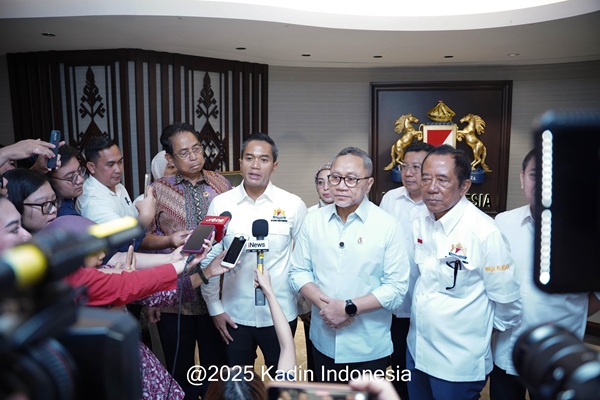
Jakarta - The Indonesian Chamber of Commerce and Industry (Kadin) held a dialogue event titled “The Role of the Private Sector in Achieving Food Security” at Menara Kadin Indonesia, South Jakarta, on Friday (July 18, 2025).
The event served as a strategic platform for discussion among business actors, government representatives, and other key stakeholders to strengthen collaboration in building a resilient and sustainable national food system.
Anindya Novyan Bakrie, Chairman of Kadin Indonesia, emphasized the importance of cross-sector synergy to support the national food security agenda, which is a top priority of President Prabowo Subianto’s administration.
“President Prabowo’s focus is on food, and Kadin can collaborate with the Coordinating Ministry for Food and its departments to drive economic progress all the way to the regional and local levels. Because without food security, it is difficult to achieve economic and national security,” said Anindya, who is often referred to as Anin.
Anin further stated that the involvement of the private sector in the food sector reflects Kadin’s evolving role in advancing development that addresses the strategic needs of the people.
“What matters most is the spirit. Today, Kadin is not only talking about heavy industry and industrialization, but also about food sustainability,” he asserted.
Meanwhile, Mulyadi Jayabaya, Kadin Indonesia’s Coordinating Vice Chairman for Food Affairs, highlighted the agricultural sector’s potential to drive national economic growth. According to Mulyadi, the communal spirit (gotong royong) in agriculture remains a key strength to accelerate economic growth to 8 percent.
“We aim to advance Indonesian food with the spirit of gotong royong. Farmers want to grow and develop. If we focus on agriculture, we can achieve 8% economic growth. Agriculture still thrives on this cooperative spirit,” Mulyadi explained.
He added that what the agriculture sector needs is not costly capital assistance, but rather support in the form of quality seeds, fertilizers, and institutional capacity-building for farmer groups. He also cautioned against the misallocation of government assistance.
“Agriculture does not require expensive capital assistance equal to high production costs. We must ensure that government funds are not wasted farmer groups should not receive aid that fails to reach their members or forces them to rent inputs at high prices,” Mulyadi stressed.
Coordinating Minister for Food Affairs, Zulkifli Hasan, reaffirmed that the government cannot achieve food and energy self-sufficiency on its own. He noted that increasingly complex global challenges require collective action from all sectors, including the business community.
“In a global economy where countries prioritize their own interests, we must move forward together. The government cannot do this alone. We want to achieve broad-based food self-sufficiency as quickly as possible covering carbohydrates, proteins, and even energy self-sufficiency and downstream industrialization,” said the minister, affectionately known as Zulhas.
He went on to say that his ministry has invited Kadin to engage in concrete partnerships to accelerate the achievement of these targets.
“I’ve invited Kadin to collaborate with us in pursuing food and energy self-sufficiency. Kadin is experienced and capable this cannot be done by the government alone. That’s why I’m calling on Kadin to work hand-in-hand with the government,” he added.
Furthermore, Arief Prasetyo Adi, Head of the National Food Agency, raised concerns about Indonesia’s dependence on imported industrial salt, which remains a major challenge despite the country’s significant domestic demand for salt across household, industrial, and medical uses.
Arief, who also heads Kadin Indonesia’s National Food Agency, stated that President Prabowo Subianto has called for the strengthening of domestic production, including the production of high-quality salt such as 98% NaCl industrial-grade salt.
“We continue to import large amounts of industrial salt. President Prabowo wants to prioritize domestic empowerment and production. The Asta Cita vision is clear—anything that can be produced domestically should be prepared and produced here,” Arief asserted.
The Kadin Dialogue event was also attended by several top Kadin Indonesia officials, including James T. Riady (Coordinating Vice Chairman for International Affairs), Juan Permata Adoe (Coordinating Vice Chairman for Export Development), Taufan Eko Nugroho Rotorasiko (Deputy Chair for Organizational Affairs), Devi Erna Rachmawati (Deputy Chair for Agriculture), Mohammed Cevy Abdullah (Deputy Chair for Livestock), Sharmila Yahya (Deputy Chair for Collaboration and Funding Development), and Titi Khoiriah (Head of Kadin’s Sharia Economic and Financial Development Agency).
Also in attendance were the Chairs of several provincial Kadin chapters, including Faurani (West Nusa Tenggara), Buchari Bachter (West Sumatra), Muhammad Nur Rahmatu (Central Sulawesi), and Anton Timbang (Southeast Sulawesi).
National Economy
Regional Economy
National Economy
Regional Economy